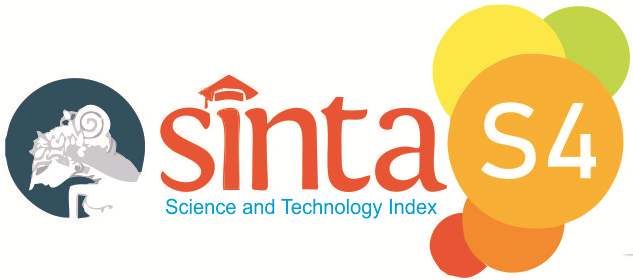Identitas matematis mahasiswa calon guru matematika: asal sekolah berbeda, identitas matematis berbedakah?
DOI:
https://doi.org/10.32332/9rzycg87Keywords:
identitas matematis, mahasiswa calon guru matematika, asal sekolah, Kruskall Wallis.Abstract
Mahasiswa calon guru matematika yang berasal dari asal sekolah berbeda sering kali menunjukkan minat, kompetensi, maupun partisipasi yang berbeda saat pembelajaran matematika. Perbedaan ini dapat menunjukkan dugaan bahwa identitas matematis yang mereka miliki bisa saja berkaitan dengan asal sekolah sebelumnya. Penelitian kuantitatif dengan teknik analisis data uji Kruskall Wallis dilakukan untuk mengidentifikasi apakah ada perbedaan identitas matematis yang dimiliki mahasiswa calon guru matematika dengan asal sekolah yang berbeda. Sebanyak 88 mahasiswa dari 3 asal sekolah berbeda yaitu MA, SMA, dan SMK dilibatkan sebagai responden dalam penelitian ini. Hasil penelitian menunjukkan bahwa meskipun nilai mean rank mahasiswa calon guru matematika dari ketiga asal sekolah berbeda, namun tidak ditemukan perbedaan identitas matematis yang signifikan secara statistik (nilai asymptotic sig 0,335 > 0,05) pada mahasiswa calon guru matematika yang berasal dari asal sekolah berbeda, termasuk untuk setiap komponen pembentuk identitas matematis. Oleh karena itu, dosen atau pendidik matematika diharapkan dapat menciptakan iklim pembelajaran yang kolaboratif tanpa membedakan asal sekolah mahasiswa demi tercapainya tujuan pembelajaran dan berkembangnya identitas matematis yang positif bagi mahasiswa calon guru matematika.
References
Boaler, J., Wiliam, D., & Brown, M. (2000). Students' Experiences of Ability Grouping—disaffection, Polarisation and the Construction of Failure1. British Educational Research Journal, 26(5), 631–648. https://doi.org/10.1080/713651583
Cribbs, J., Jimenez, K. P., & Mantone, J. (2015). The Relationship between Mathematics Identity and Personality Attributes with Students' Career Goals. North American Chapter of the International Group for the Psychology of Mathematics Education, 502–509.
Heffernan, K., Peterson, S., Kaplan, A., & Newton, K. J. (2020a). Intervening in Student Identity in Mathematics Education: An Attempt to Increase Motivation to Learn Mathematics. International Electronic Journal of Mathematics Education, 15(3), em0597. https://doi.org/10.29333/iejme/8326
Heyd-Metzuyanim, E., Sharon, A. J., & Baram-Tsabari, A. (2021). Mathematical media literacy in the COVID-19 pandemic and its relation to school mathematics education. Educational Studies in Mathematics, 108(1–2), 201–225. https://doi.org/10.1007/s10649-021-10075-8
Kurniawati, A. D., Juniati, D., & Abadi. (2022). Development of the Pre-Service Teachers' Mathematics Identity Instrument (P-STMI). Acta Scientiae, 24(6), 338–369.
Kurniawati, A. D., Juniati, D., & Abadi, A. (2023). Mathematics Identity of Prospective Mathematics Teachers: Content Analysis of Open-Ended Survey Questions. Participatory Educational Research, 10(4), 181–201.
Legette, K. B., & Kurtz-Costes, B. (2021). Curricular tracking, students' academic identity, and school belonging. The Journal of Early Adolescence, 41(7), 961–981.
McGee, E. O. (2015). Robust and fragile mathematical identities: A framework for exploring racialized experiences and high achievement among black college students. Journal for Research in Mathematics Education, 46(5), 599–625. https://doi.org/10.5951/jresematheduc.46.5.0599
Radovic, D., Black, L., Williams, J., & Salas, C. E. (2018). Towards conceptual coherence in the research on mathematics learner identity: a systematic review of the literature. Educational Studies in Mathematics, 99(1), 21–42. https://doi.org/10.1007/s10649-018-9819-2
Solomon, Y. (2009). Mathematical literacy: Developing identities of inclusion. Routledge.
Wiliam, D., & Bartholomew, H. (2004). It's not which school but which set you're in that matters: the influence of ability grouping practices on student progress in mathematics. British Educational Research Journal, 30(2), 279–293.
Wilson, M., & Matthews, J. S. (2024). Black adolescents' motivation to resist the false dichotomy between mathematics achievement and racial identity. Npj Science of Learning, 9(1), 15. https://doi.org/10.1038/s41539-024-00219-9
Zavala, M. del R. (2014). Latina/o Youth's Perspectives on Race, Language, and Learning Mathematics. Journal of Urban Mathematics Education, 7(1), 55–87.
Downloads
Published
Issue
Section
License
Copyright (c) 2024 Annisa Dwi Kurniawati, Muhammad Rizqi Saputra

This work is licensed under a Creative Commons Attribution 4.0 International License.

















